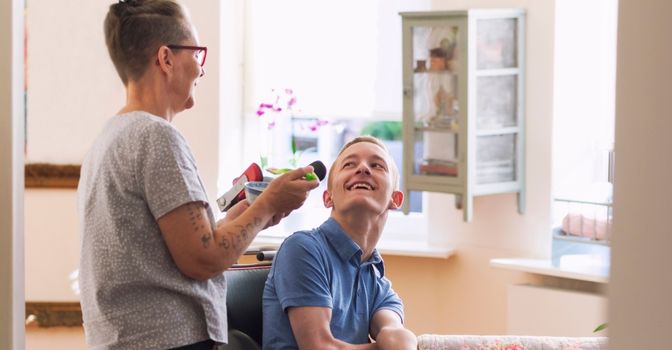Getting help with daily personal activities can be the first step on the journey to achieving your goals.
If you need assistance with personal hygiene, eating and drinking, mobility or other aspects of personal care, the NDIS may be able to help.
Today we’re taking a look at personal care supports which include funding a person to assist with or supervise tasks associated with daily life.
What are personal care supports?
Personal care supports help you to do everyday personal activities like starting your day, eating or completing tasks of a personal nature throughout the day.
In most cases, personal care supports involve a support worker assisting you to complete daily tasks or providing supervision for you to do tasks safely yourself.
Some examples include:
- Managing personal hygiene with showering, bathing, oral hygiene, dressing and grooming
- Looking after and assisting with bodily functions
- Assisting with eating and drinking
- Attending appointments
- Assisting with the use of aids and appliances
- Helping with mobility (for example in and out of bed)
- Basic first aid for injuries sustained as a result of your disability.
How does the NDIS assist with personal care supports?
Personal care supports come under the Core Supports budget – Assistance with Daily Life support category in your NDIS Plan.
Many factors are considered before deciding whether or not to include personal care supports in your NDIS Plan. First and foremost, The NDIS must be satisfied that the support is reasonable and necessary and assists you to pursue your goals, objectives and aspirations.
They also consider whether this type of support is the best option to maximise your independence and improve your ability to do things for yourself over time.
While the NDIS considers other supports provided by carers such as family members, it will also take into account any request that intimate personal care not be provided by family members or friend.
What personal care supports might look like:
In most case, supports are limited to a maximum of 6 hours a day and might include:
- Bathing, dressing, toileting and grooming (up to two hours)
- Assistance with eating and handling medication (up to two hours)
- Mobility including exercise, positioning and moving. (up to one hour)
- Where toileting assistance alone is required, up to one hour.
However, in some cases the NDIS may decide to fund higher levels of personal care support. They will consider things like:
- Whether you have high care needs, for example unstable seizure activity or respiratory support
- Your weight and medical condition, including any medication required
- If the need for higher support is temporary
- If two support people are needed for transfers
- Whether the participant has behavioural concerns.
Another thing the NDIS considers is whether assistive technology or home modifications can be used to reduce the level of assistance you may need with daily personal activities.
Personal care supports for children.
Keep in mind that personal care supports are not intended to support the everyday care and supervision that parents provide for their children such as taking children to appointments or assisting them with toileting.
The NDIS may fund personal care supports where a child has complex needs or more support is needed than for other children of the same age because of the child’s disability.
“Personal care in school” supports are different to standard personal care supports. These supports are listed on an NDIS Plan but are provided by school staff through the education system. The NDIS does not fund these supports and you can’t pay for them with your child’s NDIS Plan.
We can help you.
Let us help you with your preparation for your first NDIS Plan meeting or Plan Review to ensure you have everything covered and make sure you have the very best chance of getting the help you need.
Call us on 1300 05 78 78 to have your questions answered, to book your free NDIS pre-planning session or sign up to Leap in! plan management today.
Originally published 2 March 2019, updated 23 August 2022 with information from the NDIS personal care supports page.

